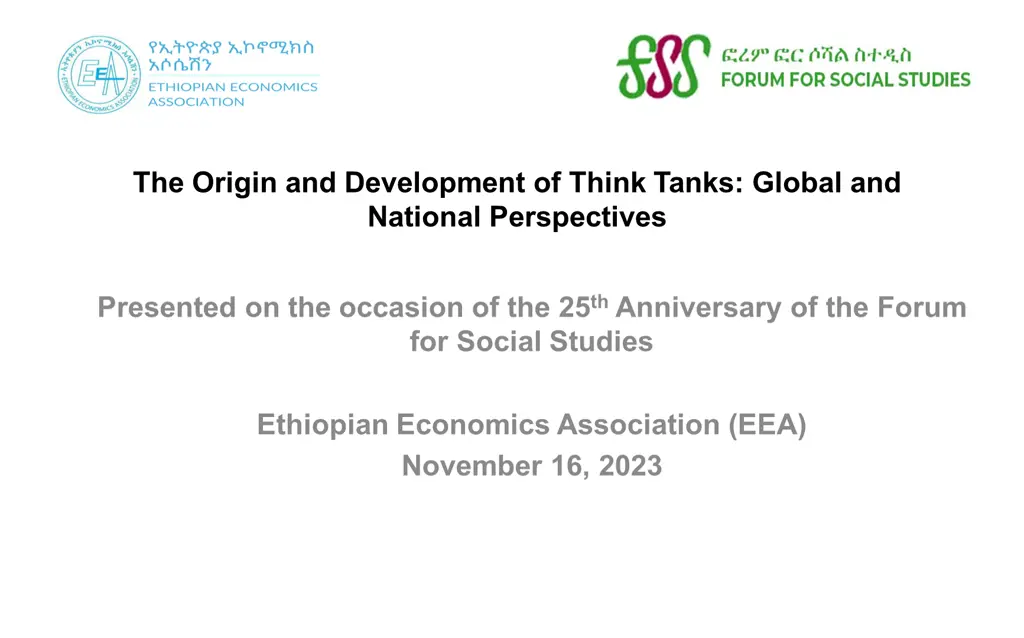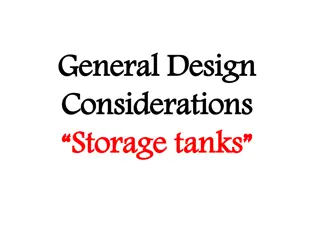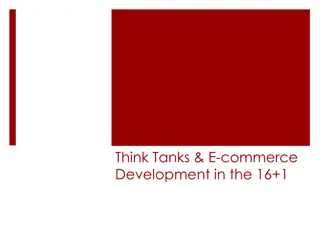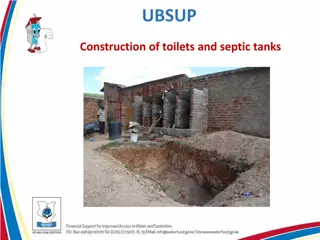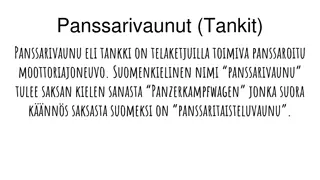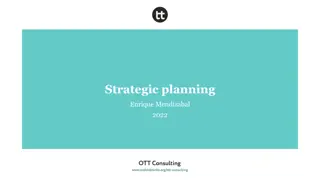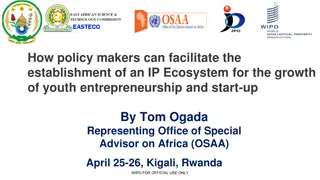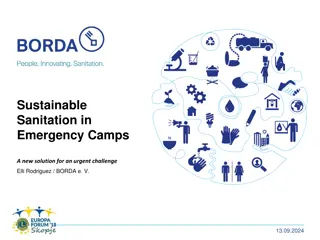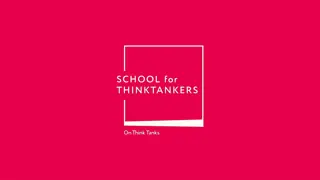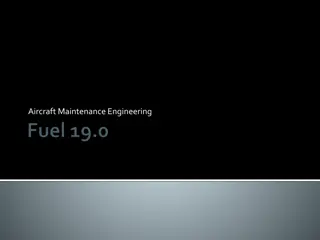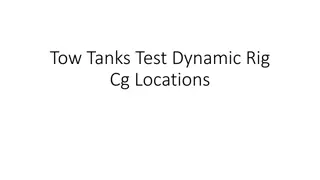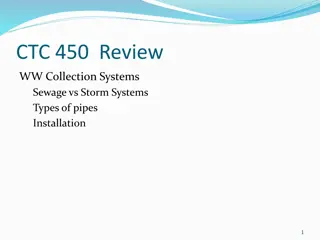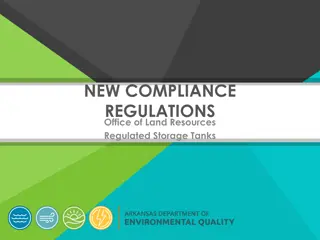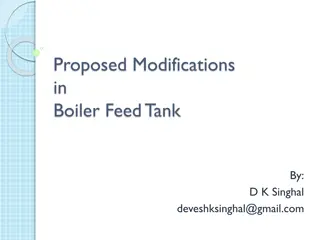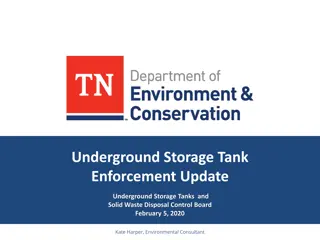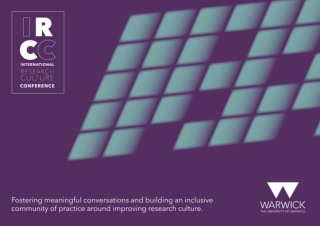Think Tanks: Insights and Impact on Global Policy
Delve into the world of think tanks, exploring their origins and evolution globally and nationally. Discover their significance as drivers of policy debates and decision-making processes. Uncover how think tanks serve as bridges between knowledge and power in modern democracies, shaping public policy. Follow the development of think tanks in both developed and developing countries, examining the critical role they play in providing timely and accurate information. Explore the criteria and principles that guide these influential organizations.
Download Presentation

Please find below an Image/Link to download the presentation.
The content on the website is provided AS IS for your information and personal use only. It may not be sold, licensed, or shared on other websites without obtaining consent from the author. Download presentation by click this link. If you encounter any issues during the download, it is possible that the publisher has removed the file from their server.
E N D
Presentation Transcript
The Origin and Development of Think Tanks: Global and National Perspectives Presented on the occasion of the 25thAnniversary of the Forum for Social Studies Ethiopian Economics Association (EEA) November 16, 2023
What is a Think Tank? Like most concepts, there is not a single and most authoritative definition organizations that produce research products with the aim of creating policy debates, informing decision-makers and making appropriate interventions in the policy process directly/indirectly. (Zeleke and Assefa, 2017) . a group of people whose sole profession is to read, write, research, and discuss topics that are of importance to the social good. It s a form of collective intelligence. Lauren Pope (2019) organizations engaged on a regular basis in research and advocacy on any matter related to public policy. They are the bridge between knowledge and power in modern democracies (UNDP, 2003: 6)
The Origin and Evolution of Think Tanks Developed World: 1. Decline in the British empire and the rise of the United States; 2. Failures in policymaking ahead of the First World War; 3. The post WWII spread of national self- determination and the weakening of colonial systems 4. Started as informal study groups now centres of expertise with full-time staff. Discussion often within a confidential setting (so-called the Chatham House Rule) 5. The unfolding of the Cold War The Thinking Process
Developing countries The expansion of Think Tanks coincided with the fall of communism in the 1990s Structural Adjustment and macroeconomic imbalance Poverty agenda The dominance of think tanks from developed countries Governments no longer hold a monopoly over information Lose of confidence in government structures and elected officials Need for accurate, timely information becoming more important than ever However, only a few developing countries have enough policy research institutes. Policy makers and the public are not well-informed.
Criteria Criteria used by the Open Think Tank Directory are: EEA Must carry out some form of research with the aim of informing public policies; Must have an independent identity; Needs to be formally registered in a country; it can undertake research or influence in the country where it is registered or any other country
Principles The eight principles developed by Struyk (2002) for the maturing think tanks are: 1. Motivating staff for improved productivity and retention; 2. Ensuring standards through quality control; 3. Innovation and organizational renewal 4. Appointing research managers 5. Corporate governance 6. Mode of research provision and product 7. Financial integrity 8. Bridging research and policy
Types of think tanks Operates independently from any one interest group or donor influence. They are self-governing and do not receive government aid Autonomous and Independent Separate from government affiliation but controlled by a specific interest group, donor, or agency that manages funding Quasi-Independent Government Affiliated A formal affiliate of the government Funded 100% by government grants, but is not part of the formal government structure Quasi-Governmental Category Definition University Affiliated A policy research centre affiliated with a specific university A policy research centre affiliated with a specific political party or ideology Political Party Affiliated Operates in conjunction with a specific corporation or on a for-profit basis. Corporate (For-Profit) Source: Lauren Pope (2019)
Distribution of Think Tanks Global distribution of Think Tanks (n=6500+) Africa distribution of Think Tanks (n=211) 40 25 35 30 20 25 20 15 15 10 % 5 10 0 5 0 South Africa Kenya Nigeria Ghana
Policy influence Realism in planning for policy impact. The routes of access and strategies of influence will vary according to historical and institutional context of a country, The degree to which a think tank is an insider or an outsider to policy communities and power holders. Moreover, a distinction needs to be made between the wider societal implications of research relevance and the more concise idea of policy influence of research . Research may have no impact on decision-makers but it does not mean it is of no utility or interest. The media, international organizations, the business sector may wish to be informed of research results. These institutions can provide an indirect route of policy influence.
National Perspectives Various studies indicate that Ethiopia has about 25 think tanks. However, the most active are no more than 10. These include: Ethiopian Economics Association Institute for Peace and Security Studies (AAU) Forum for Social Studies Ethiopian Initiative for Development Association of Ethiopian Microfinance Institutions (AEMFI) Policy Studies Institute (formerly Ethiopian Development Research Institute) Inter Africa Group (IAG) Environmental Economics Policy Forum for Ethiopia (EEPFE) Women Lawyers Association
The case of EEA Established in 1991/92: 32 years; Ethiopia average = 26; African average = 22; world average = 31yrs Vision: to be a premium economics association in Africa by 2030 Motto: Professionalism and Economic Thinking for Development Accredited journal: Ethiopian Journal of Economics - this is a key indicator of Think Tank status
Areas of Themes The Social Sciences are the dominant areas of research for Think Tanks Top 6 African Think Tanks Research Themes 1. Governance and Transparency 2. Environment, Natural Resources and Energy 3. Trade, Economics and Finance 4. Food and Agriculture 5. Social Policy 6. Health EEA Research Themes Macroeconomy Institutions, Environment and Climate Change Trade and Industry Agriculture and Rural Transformation Welfare and Human Development Gender and Women s Economic Empowerment
Publication and dissemination methods 2022/23 Media Unit EEA Ethiopia average Global average Publication Facebook Facebook Twitter YouTube Dialogue forums No. No. Likes Followers Followers Subscribes 27 11 66 13,000 15,000 427 770 5997 27,107 - - 687 1141 20,003 6278 27 - - Source: https://onthinktanks.org/think-tank/ethiopian-economics- association/
Think Tank Initiative Assessment of EEA: Institutional indicators Value of inperson events Transparency Research dissemination Regional knowledge Quality of researchers EEA/EEPRI East Africa Country average Knowledge of policy making process Informed critique of public policy Focus on high priority issues Partnership with other policy actors Engagement with policy makers Clear communication 0 10 20 30 40 50 60 70
Think Tank Initiative Assessment of EEA: Output indicators Timeliness Relevance Quality of Recommendations EEA/EEPRI East Africa Country average Objectivity Clarity Availability Accuracy 0 10 20 30 40 50 60 70
Think Tank Initiative Assessment of EEA: Usefulness of Output Unpublished website content Reports EEA/EEPRI East Africa Country average Newsletters Journal articles Books 0 10 20 30 40 50 60 70
EEA: A unique organisation with multiple features Subject to high standards of research, publication Think tank Subject to CSO law EEA CSO Academic Subject to education regulations Income Generation Subject to commercial code The Bottom line: EEA is a MEMBERSHIP organisation!
Opportunities & Challenges Opportunities Voluntarism Advancements in information and technology Dynamics of research agendas on economic impacts of covid, conflict, BRICS, etc Public thirst for up to date economic information and knowledge Challenges Most common challenges facing African Think Tanks including EEA Funding Political uncertainty Conflict The legal framework lumps CSO, NGO, mass based associations, professional associations, think tanks all together Inability to expand outreach and visibility The education system does not supply competent researchers
Conclusions & Recommendations Conclusion We (Africans/Ethiopians) have fallen behind the rest of the world because: We are not generating enough ideas. If just a handful of Think Tanks were enough, USA would not have had over 1800 Think Tanks Our Think Tanks are not given the space to implement their ideas (e.g. EEA s Vision 2020) Recommendations Appropriate rules and regulations governing Think Tanks. Ideally, self-governing modality rather than rules imposed from above Enhanced and formalised collaboration between Think Tanks in Ethiopia (perhaps a regular meeting mirroring the African Think Tank Summit) The bottom line is we need more think tanks
References 1. Samuel Alemu (2018) The role of think tanks and lessons for policymaking in Ethiopia. The Reporter, June 23, 2018 https://www.thereporterethiopia.com/5782/ (accessed 03/11/2023) 2. Robel Yohannes (2017) Ethiopia: Experts Highlight the Need for Strengthening Think Tanks. 20 SEPTEMBER 2017. The Ethiopian Herald (Addis Ababa) https://allafrica.com/stories/201709200728.html (accessed 03.11.23) 3. Chatham House (2018) A History of Think-Tanks: 12 Things You Should Know. 22 NOVEMBER 2018 HTTPS://WWW.CHATHAMHOUSE.ORG/2018/11/HISTORY-THINK-TANKS-12-THINGS-YOU- SHOULD-KNOW (ACCESSED 03.11.23) 4. Diane Stone (2005) Think Tanks and Policy Advice in Countries in Transition. Paper prepared for the Asian Development Bank Institute Symposium: How to Strengthen Policy-Oriented Research and Training in Viet Nam , Hanoi, 2005 5. Terefe Zeleke and Deribe Assefa (2017) Think Tanks and University Relations in Ethiopia. Journal of Advance Public Policy and International Affairs (JAPPIA), Vol. 4, No. 5
Thank You! Happy Anniversary! https://eea-et.org/
